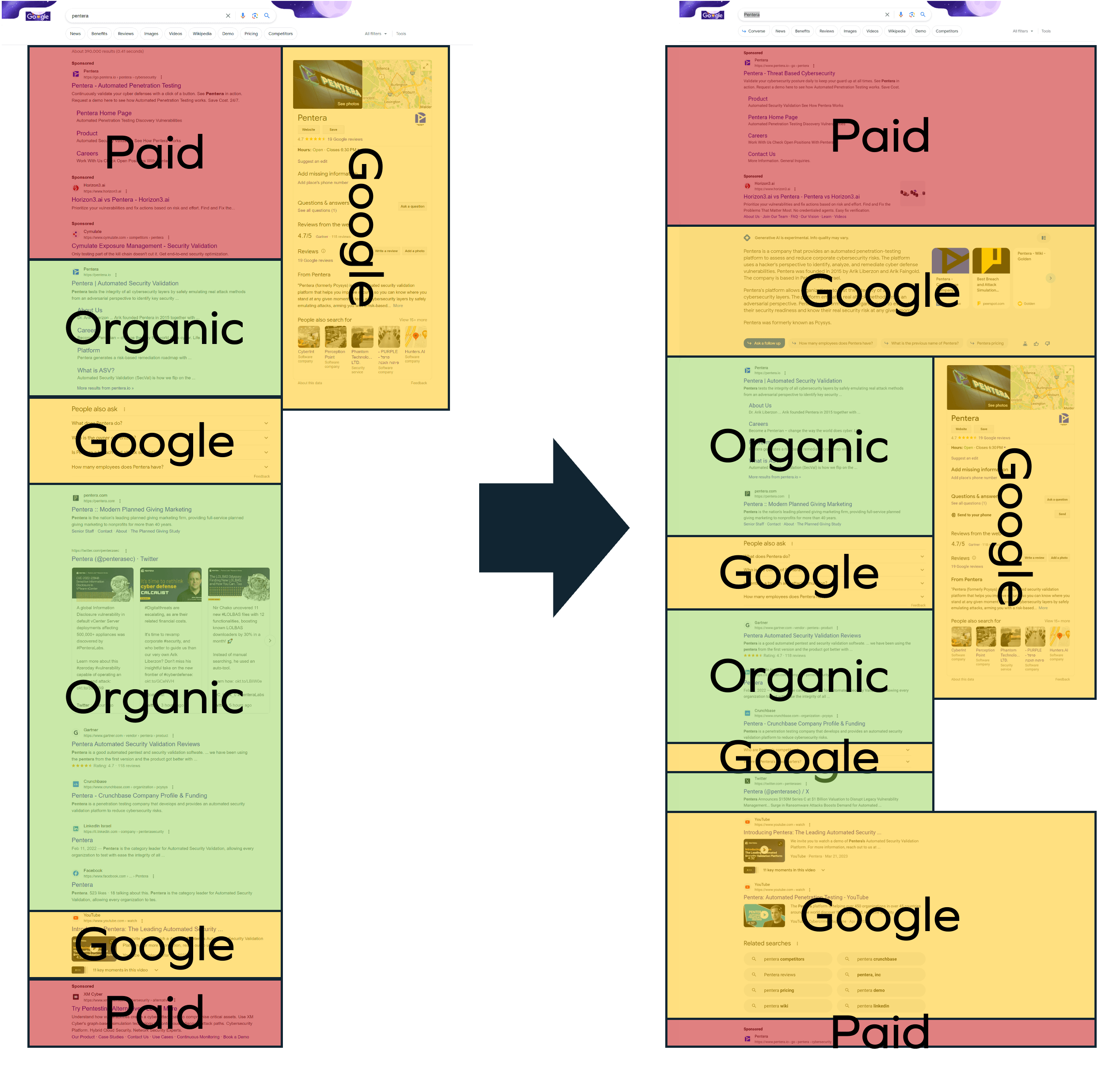Google's New AI Search Engine Will Change Organic Website Traffic Forever
If you're worried about organic traffic and driving engagement to your website, you're going to want to pay attention to Generative Search Optimization or Generative Engine Optimization... also known as #GEO.
Google had a massive shift to its algorithm in the last month and in less than 50 days everything will change in the world of SEO. Many websites that were affected had poor user experiences. For years, a lot of people have been trying to game the system and rank their site with a lot of low, unoriginal poor content. As generative search becomes king in content strategy, category websites like travel and recipe-based websites littered with ads could become obsolete. This is why the SEO industry is changing and has propelled Google to debut the Search Generative Engine.
First of all, Google is finally cracking down on spammy content and its solution is Search Generative Optimization. If you're sick of Google searches rendering a bunch of spam and AI-written content, then this could benefit niche brands who invest time in design and quality. With the recent upgrades in Search, Marketing professionals will need to level up their expertise and offerings. On Reddit, a lot of people who specialize in SEO are even questioning their job stability and contemplating changing careers.
According to Insight Partners:
GenAI will have a transformative effect on users’ search experience, and there will be myriad second-order impacts of that change in the scaleup ecosystem. Web traffic to companies could fall significantly, and GTM motions will be shaken up. New Google Labs experiments indicate the direction Google is moving, and we think it’s a bellwether for how search overall is evolving towards more zero-click searches.
What will brand positioning be like with generative search optimization?
The generative experience will be led by human prompts, or questions users will be able to ask to get the results they are looking for in a more cohesive package. That means brands that are used to organic website positioning will be pushed further down the page if the provided prompt has nothing to do with your brand. There will be more paid sponsorship opportunities for brands who wish to have product placements front in center. Basically, the user design mechanics will be challenged.

In terms of products, links and other product placements will be prioritized.
The new generative AI search experience will look like the below diagram, according to Insight Partners, which explains how Google search is set up on the right, and how it will look when GEO is active on the left.

In the new Generative Search experience, you’ll notice a "corroborative" approach to how its AI generative results are rendered from user to user.
Blogging will get harder. If Marketers rely on organic search traffic, your brand is about to have a huge awakening in what it means to be on the front page of Google.
To roll with the tide, brand mentions and links from authoritative publications will be prioritized with its AI generative results and earned and paid media or press will become incredibly valuable. If your brand lacks press mentions, this will make it harder to be rendered in a generative AI search response.
Here are some tips on how to navigate content strategy with Search Generative Engine:
- Brands and publishers are going to rely more heavily on social platforms for organic traffic so choose your content and captions wisely. If you've never explored microblogging on TikTok or Instagram, it may be a great to start if you know you can't compete with competitors who will have bigger budgets to pay for Google's new Generative Search Placements.
- Prioritizing good press in outlets will be Paramount to even having the chance to be rendered in a Generative search response. If someone writes a prompt about, "Top restaurants to eat at on vacation in Cabo," to be mentioned in the response, your brand will have to be mentioned in an authoritative source across the web.
- Find articles or listicles across the web and figure out how to align and leverage their coverage with your brand. It’s inevitable that your website traffic will decrease, especially if you rely on organic search traffic. Strategizing ways to still play the generative search game will at least keep you relevant.
- To future-proof your business, priority creative assets will be long-form videos since this will be the last thing people or generative AI can copy. By releasing 3-10 minute video clips in horizontal format, this will be a sure way to stand out regarding searchable content.
One caveat to note and consider is that there's no framework as yet, so the above is trial and error. Plus, the strategic approach could vary with other search engines. There are even lengthy research papers like this to mitigate future problems. But as of late, we're all navigating this dark forest of algorithms together!
According to GEO: Generative Engine Optimization by The Allen Institute of AI in New Delhi:
The usefulness of generative engines for both their developers and users is evident – users can access information faster and more accurately, while developers can craft precise and personalized responses, both to improve user satisfaction and revenue. However, generative engines put the third stakeholder – website and content creators – at a disadvantage. Generative Engines, in contrast to traditional search engines, remove the need to navigate to websites by directly providing a precise and comprehensive response, which can lead to a drop in organic traffic to websites and severely impact their visibility. With several millions of small businesses and individuals relying on online traffic and visibility for their livelihood, generative engines will significantly disrupt the creator economy. Further, the black-box and proprietary nature of generative engines makes it prohibitively difficult for content creators to control and understand how their content is ingested and portrayed by generative engines.
In conclusion, this is just the beginning of generative AI search engines and this new chapter in digital content strategy. Brands must adapt their approach to ensure visibility in this quickly changing landscape. By leveraging social platforms, cultivating mentions in authoritative sources, and aligning with existing web content through long form videos, brands can navigate the evolving terrain of organic traffic optimization.
Header Photo by Adem AY on Unsplash
Read more AI content on Violet Verse
Trend Report: How Blockchain Empowers AI